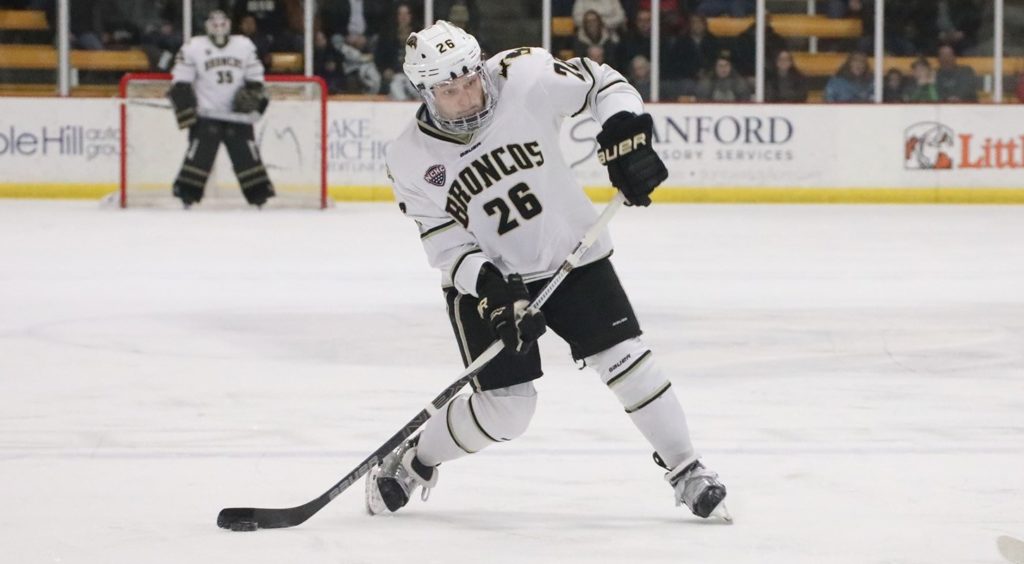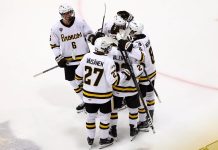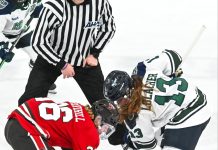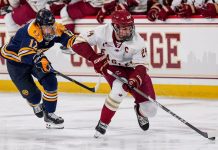
The city of Ethen Frank’s birth and the metro area in which he spent much of his youth both have NCHC teams, but the Western Michigan senior forward plays for neither of them.
More and more, Denver and Omaha’s loss has been the Broncos’ gain.
Frank just finished a nearly month-long stay between Omaha, Neb., and his hometown of nearby Papillion, Neb., the cities being separated by little more than a county line. He played in nine of WMU’s 10 games in the NCHC pod at Omaha’s Baxter Arena, and he headed back to Kalamazoo, Mich., on Wednesday after celebrating Christmas early with his family.
Some of the Broncos flew home out of Omaha last Sunday, the day after WMU finished its time in the NCHC pod by skating to a 3-3 tie with Denver. All Frank had to do was tell the Broncos’ staff that his parents would be picking him up from the team’s hotel.
Finally, Frank got to actually visit in person with his parents, who moved with him from Denver to Papillion when he was in the middle of elementary school. At the time, his parents had taken an opportunity to operate a local roller rink, which they still own.
“In a normal season, with fans and stuff before COVID, we’d meet our parents in the loading dock by our bus, but they weren’t really allowed to come see me during the pod,” Frank said. “That sucked, but you just call and text as much as you can to stay updated with each other.
“We all understood that I was there for hockey and not there to see my parents, but I knew I’d see them after the pod was over, and they got how serious it was and that I needed to worry about hockey when we were playing.”
At least in terms of his own game, that worked out well. WMU (2-6-2) started on the back foot when the Broncos lost their No. 1 goaltender to a long-term injury in the team’s season opener Dec. 1 against St. Cloud State, but Frank is the team’s leading scorer with six goals on 22 shots. Three of his goals came on power plays, and he also set up teammates with two assists.
He missed WMU’s pod finale Saturday with an injury, but Broncos coach Andy Murray noted after the game that it was only decided that afternoon that Frank would sit out. He is expected to be back in practice when the Broncos reconvene this Sunday, Dec. 27.
WMU had taken two buses and a trailer to Omaha for the NCHC pod, and the Broncos aren’t expected to fly for any road games this season amid the ongoing COVID-19 pandemic. Frank brought two duffel bags, two backpacks and four smaller bags with snacks and other goodies. He also packed enough clothes for three weeks, a water filter and his Xbox video game console, which turned out to be a common way that players kept in touch with each other at their hotel despite not having any roommates, which they normally would on road trips.
“I tried to make the hotel room feel like home,” Frank said. “You’re there for so long, and I didn’t want it to feel like a boring hotel room, so I brought things I had in my room. I was starting to plan it out two or three weeks before we left, and we’d ask around about what guys were bringing, and just get ideas on how much to bring. A four or five-day road trip isn’t the same as three weeks.”
As for returning to Baxter Arena, a venue Frank had scored at twice in a February 2019 game, he felt that measures were taken to make the arena feel like as much of a neutral site as it could be.
“You have to approach them like they could be played anywhere,” he said. “You have to prepare like it’s any other game, and not really worry about the pod or the situation you’re in, because when you have a game in front of you, you can’t really take your mind off of it.
“They had six or seven locker rooms that teams rotated through, and after games you’d move to a new locker room, and the teams that were playing had the two main locker rooms. We were in the UNO room once, which was kind of weird, but they treated it as a neutral site, and at times it did feel like we were on the road or at home because of the pregame songs they’d play, and a hype-up video with starting lineups.”
In a way, playing in the pod was a matter of what could’ve been for Frank. He played for a AAA youth hockey team in Omaha before joining the USHL’s Lincoln Stars. He committed to WMU at 16, but he had previously been looking at UNO in a time before the Mavericks’ current coaching staff took the reins.
“I had a few phone calls with (UNO), and we were kind of getting close to setting up a visit, and I didn’t really have an advisor at the time, but my coach was talking with them and then telling me what they were saying, and said they would call and set up a visit,” Frank said.
“That kind of fell through, but Western offered me, and they’re in the same conference. I thought it’d be kind of cool since I played in Lincoln, playing against Omaha, and being from there, just being the bad guy. A lot of people in Omaha and people on social media set me out to be the bad guy, but it wasn’t really my fault that UNO didn’t call me back.”
WMU’s 6-5 loss to Omaha on Dec. 18 was Frank’s last scheduled game at Baxter, and he scored a second-period goal that put the Broncos ahead 4-2.
Whether he plays there again or not, he is excited about what the rest of the season holds.
“Consistency is what I’ve talked with my teammates and some other people about, and I just want to play consistently and hard every day and not worry about points,” he said.
“If you play hard and play the right away, things will take care of themselves, and you can’t really focus on the outside. You just focus on the next shift and not worry about the past. You’re just focused on what’s ahead of you and playing hard, no matter what the score is or how much time is left.”
It’s been a weird month, though, in a year like none other. Some things haven’t changed — “It’s been three or four years in a row now where I haven’t been home on Christmas,” Frank said — but the NCHC pod experience was something Frank won’t soon forget. Indeed, depending on how the pandemic shakes out in the coming months, it’s not beyond the realm of possibility that Omaha’s was the last pod he would ever play in.
“We just looked at it as that we were very fortunate to be there, because we were seeing other hockey teams that were canceling their seasons and weren’t able to play,” Frank said. “We saw the pod as a good opportunity, and we were just happy to be on the ice.
“We were really positive about the whole thing, and the NCHC was able to put something together to get the first half of the season in, and we were happy about that. We heard a couple rumors that there could be a bubble for the playoffs or something like that, and some guys are excited and some guys kind of get worn out by the three weeks in the hotel and the same food every day, but you’ve got to not worry about that because you’re there for the hockey.”
Fenton: No active infection believed to take place across pod’s Tier 1 personnel
NCHC commissioner Josh Fenton told reporters during a socially-distanced press conference Tuesday that the conference believes it had zero active COVID-19 infections across all Tier 1 personnel for the entire duration of the NCHC pod in Omaha.
“When we’re all said and done here, because the numbers may not be exact, we’ll have run almost 3,000 tests over the past three weeks,” Fenton said. “That’s a combination of PCR (molecular diagnostic) tests, plus a rapid antigen test, and we went through some challenging times initially when we cleared everybody on the initial arrival test.
“The guidance from the doctors (was that) it was best to test everybody, regardless of whether you were a previous positive or not, because they have seen cases of reinfection, although rare. What we found was a little bit what we expected, maybe not to the level, that some did test positive, but we had a protocol in place to address positive tests and prior positives, and that was looking things like CT values and antibody levels, or testing positive for antibodies, whether it be here in the pod or maybe documentation of positive antibody testing prior to coming to the pod.”
Tier 1 personnel were required to take a PCR test every Monday during the pod, as well as rapid-response antigen tests three to four times per week. These personnel included players, coaches, team support staff, officials, conference staff, additional medical support and select Baxter Arena staff.
Colorado College started late at the pod due to a Tigers player testing positive prior to the event. That meant that the entire CC team quarantined for two weeks before beginning its season at Baxter Arena. The Tigers opened Dec. 8 with a shootout win over Western Michigan, but CC is officially 2-4-2 at the winter break.
The NCHC had originally planned to play 40 games but crossed two off. Still, once action got underway, all 38 games were played without any cancellations. Fenton puts that success down to stringent health and safety guidelines that the conference adhered to.
“We knew it was a significant schedule and the effort was going to have to be there to get through it,” Fenton said Tuesday when asked if he believed, going into the pod, that the league would get all 38 games in without interruption.
“I don’t know what we thought we should expect from potential disruptions relating to testing, but we believed in the protocol, we believed in the plan, so I guess the answer to the question is yes, we did believe that we could get through it.
“We would’ve played 40 hockey games over the past three weeks, and it was an accomplishment in and of itself to do 38, so the protocol is what had me believing coming into it that we could execute and get it done,” Fenton said. “There were certainly some unknowns that came up, and we had to work through some of those things…but we believed in the protocol, and I think the protocol showed that it can work.”
NCHC action resumes in Dec. 31 back in Omaha, when North Dakota visits UNO for a Thursday-Friday series. Fans will be limited to 1,500 spectators, socially distanced, and season ticket holders get first dibs.


